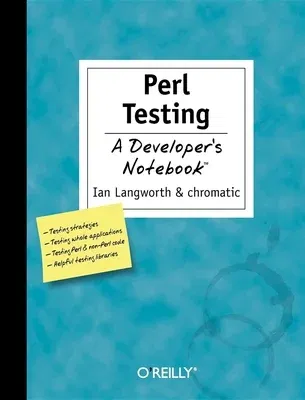Is there any sexier topic in software development than software testing?
That is, besides game programming, 3D graphics, audio, high-performance
clustering, cool websites, et cetera? Okay, so software testing is low
on the list. And that's unfortunate, because good software testing can
increase your productivity, improve your designs, raise your quality,
ease your maintenance burdens, and help to satisfy your customers,
coworkers, and managers.
Perl has a strong history of automated tests. A very early release of
Perl 1.0 included a comprehensive test suite, and it's only improved
from there. Learning how Perl's test tools work and how to put them
together to solve all sorts of previously intractable problems can make
you a better programmer in general. Besides, it's easy to use the Perl
tools described to handle all sorts of testing problems that you may
encounter, even in other languages.
Like all titles in O'Reilly's Developer's Notebook series, this "all
lab, no lecture" book skips the boring prose and focuses instead on a
series of exercises that speak to you instead of at you.
Perl Testing: A Developer's Notebook will help you dive right in and:
- Write basic Perl tests with ease and interpret the results
- Apply special techniques and modules to improve your tests
- Bundle test suites along with projects
- Test databases and their data
- Test websites and web projects
- Use the "Test Anything Protocol" which tests projects written in
languages other than Perl
With today's increased workloads and short development cycles, unit
tests are more vital to building robust, high-quality software than ever
before. Once mastered, these lessons will help you ensure low-level code
correctness, reduce software development cycle time, and ease
maintenance burdens.
You don't have to be a die-hard free and open source software developer
who lives, breathes, and dreams Perl to use this book. You just have to
want to do your job a little bit better.

